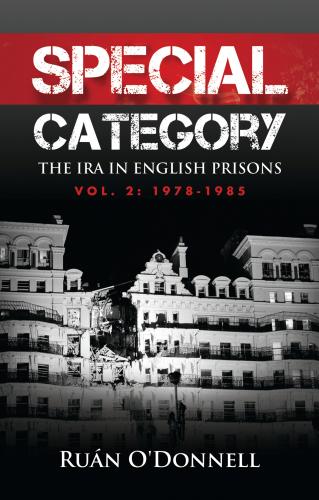196.Gartree PRO in Republican News, 10 June 1978.
197.Republican News, 21 January 1979.
198.Hill, Stolen years, pp. 195–7. Hill, following the privations of Hull, regarded Gartree as ‘a liberal establishment. I wear a sweat shirt and trainers. The screws are not so aggressive. But it’s no good. I can’t settle in. I should not be in prison, I am innocent. I argue and demonstrate’. Ibid., p. 197.
199.AP/RN, 29 July 1982. See also O’Donnell, Special Category, I, p. 428.
200.AP/RN, 29 July 1982.
201.Republican News, 10 June 1978 and Irish political prisoners, p. 13. Noel Moore Boyd was also named in connection to the Kilburn attack while associates Alexander Brown and Archibald Brown were charged with related offences. Boyd and Carson appeared in court on 4 March 1976. They were convicted on 12 October 1976, receiving terms of between ten and fifteen years. Sr. Clarke, ‘Biddy Mulligan’s Explosion’, Clarke Papers (COFLA). Boyd was on good terms with Gerry Conlon and several IRA prisoners in Long Lartin. Conlon, Proved Innocent, p. 199. Three members of the ‘Manchester Loyalist Association’ were charged with possession of firearms on 26 February; David Anderton, Robert Watson and Malcolm Rough. PAC Bulletin, March 1976.
202.Republican News, 10 June 1978. The person referred to as ‘Gudd’ in the published account was convicted English Loyalist John Gadd. Sr. Clarke received information that Tommy Thompson, regarded as a leading Loyalist in England, was one of the very few on the Category A list yet even then received ‘preferential treatment’ when in Hull. See Clarke to Kilbracken, 26 January 1978, MS letter draft, Clarke Papers (COFLA).
203.Cohen and Taylor, Prison secrets, p. 56.
204.Report of Her Majesty’s Chief Inspector of Prisons, 1983, p. 17.
205.In 1974 two Loyalists jailed in England were granted temporary transfers to the North of Ireland ‘to receive visits’ over a period of twenty-three to twenty-seven days. One was granted a permanent transfer in 1975 and the second was downgraded to Category B in 1976. The Category B Loyalist received a second temporary transfer of twenty-nine days in 1978. See HC Deb 21 June 1978 vol 952 c205W.
206.HC Deb 21 June 1978 vol 952 cc205–6W.
207.HC Deb 21 June 1978 vol 952 cc205–6W. Rees noted: ‘Prisoners and their visitors [in Wakefield] are allowed to embrace at the beginning and end of visits held under these conditions’. Ibid.
208.Irish News, 5 July 1995.
209.HC Deb 11 July 1978 vol 953 cc494–5W.
210.Lord Harris to Joan Maynard, 22 June 1978, Clarke Papers (COFLA).
211.Martin Wright to Fenner Brockway, 16 May 1978, Clarke Papers (COFLA).
212.Wright to Brockway, 16 May 1978, Clarke Papers (COFLA). See also Lord Harris to Fenner Brockway, 12 July 1978, Clarke Papers (COFLA). Brockway had a long history of intercession for political prisoners in England. At the height of the IRA ‘Border Campaign’ of 1956–62 he sought compassionate parole for EOKA prisoner George Ioannou, a comrade of republican prisoners in Wakefield who planned a joint escape. See Fenner Brockway to RA Butler, 25 July 1958 in Vias Livadas, Cypriot and Irish political prisoners held in British prisons, 1956–1959 (Nicosia, 2008), p. 219.
213.Martin Wright to Sr. Sarah Clarke, 27 February 1980, Clarke Papers (COFLA). Wright recommended the services of Offenbach & Co; George E Baker & Co (Alastair Logan) and BM Birnberg & Co (Gareth Pierce). Wright reminded Sr. Clarke that prisoners were obliged to use all ‘internal procedures’ before contacting a private solicitor. Ibid.
214.For Kelly and Feeney see Andersonstown News, 14 April 1975.
215.Republican News, 10 June 1978.
216.Republican News, 22 July 1978 and Irish World, 15 July 1978.
217.Republican News, 22 July 1978. Donnelly began fasting in Long Lartin due to the refusal of the staff to authorize an exploratory x-ray. This rebuff, and simultaneous axing of a milk supplement he needed for his health provoked the hunger strike. The move to Wakefield aroused suspicions that the ‘same regime’ which ‘murdered’ Stagg was threatening Donnelly. Ibid. Stagg and Gaughan were commemorated in Leigue Cemetery, Mayo, on 16 July 1978. Daithi O Conaill gave the oration. Irish Times, 17 July 1978.
218.McLaughlin, Inside an English jail, pp. 42–3. Duffy was sent on a ‘lie down’ from Wormwood Scrubs to Wandsworth on 29 December. On completion of the twenty-eight days he was moved to Wakefield and a further ‘lie down’ in Bristol. Republican News, 22 March 1978. When in Wormwood Scrubs Duffy attacked a prison officer who had assaulted him previously. Sr. Clarke, ‘Joe Duffy/ Mooney’, Clarke Papers (COFLA). ‘Joe Duffy’ was the name used by Dubliner Michael J Mooney when convicted in England. Irish People, 5 February 1983. See PAC News, February 1978, p. 1.
219.FRFI, March 1984, p. 12.
220.Irish Times, 4 August 1978.
221.Republican News, 5 August 1978. Armstrong met Eddie Butler in Manchester. Butler had been in the block for seventeen weeks. They were denied normal outdoor exercise rights as the authorities had commenced building a ‘wire cage’ to prevent helicopter escapes. Armstrong to Wilson, 25 July 1978, Private Collection (Wilson). Butler received just an hour long ‘closed’ visit from his mother and a sister who had traveled from America. Republican News, 5 August and 30 September 1978. Armstrong claimed that the Wakefield move occurred on 3 July, although McLaughlin indicted 5 July. McLaughlin, Inside an English jail, p. 43.
222.Republican News, 29 July 1978. In 1978 F Wing retained its Control Unit style regime of cold meals, a rule of silence, minimum communication with staff, isolation from other prisoners and dim lighting.
